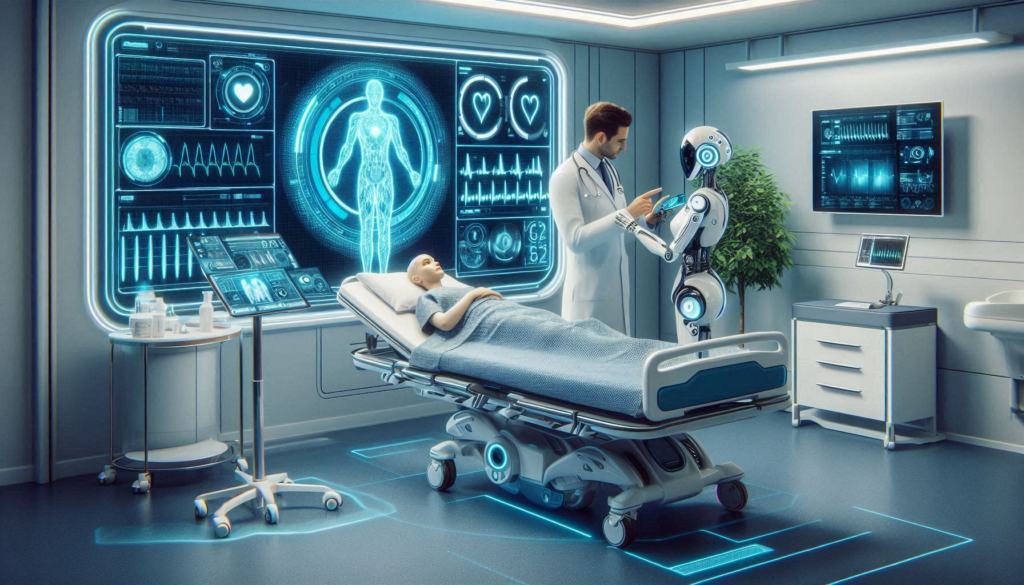What is the use of AI in Healthcare with examples?
Nowadays AI is involved everywhere in healthcare from Drug development to Billing and coding. Through This blog series, we will discuss more than 25 topics where AI is involved in healthcare. I will try to write this blog in a very simple language. I will explain each topic with examples so let’s start

In this blog, we will discuss 5 topics
- Use of AI in Drug Development
- Use of AI in Personalized Treatment
- Use of AI in Medical Imaging
- Use of AI in Robot-Assisted Surgery
- Use of AI in Clinical Trail Participation
Use of AI in Drug Development

Artificial intelligence (AI) is revolutionizing the entire drug development process, from discovery to postmarket safety surveillance. Let’s explore how AI impacts different stages:
Drug Discovery:
- Target Identification: AI predicts potential drug targets based on biological data.
- Compound Screening: AI screens vast chemical libraries to identify promising drug candidates.
Clinical Research:
- Patient Recruitment: AI analyzes patient data to find suitable trial participants.
- Dose Optimization: AI recommends optimal dosing regimens for safety and efficacy.
- Clinical Endpoint Assessment: AI evaluates trial outcomes.
Postmarket Safety Surveillance:
- Case Processing: AI automates adverse event reporting.
- Case Evaluation: AI assesses safety signals.
- Advanced Pharmaceutical Manufacturing: AI optimizes process design and monitoring.
Examples:
- Drug Discovery: Atomwise’s AI identified potential COVID-19 drugs.
- Clinical Trials: IBM Watson helped match patients to suitable trials.
Use of AI in Personalized Treatment

Personalized Treatment Plans with AI in Health Imagine having a personal healthcare assistant who understands you better than anyone else—your quirks, preferences, and medical history. Thanks to the incredible power of AI, this dream is now a reality. Here’s how it works:
- Data Analysis: AI algorithms analyze vast amounts of data, including genetic makeup, lifestyle choices, and medical records.
- Tailored Plans: With this information, AI tailors treatment plans specifically for each individual.
- Precision Medicine: Gone are generic options; AI makes healthcare precise, offering individualized solutions.
- Empowering Patients: Patients actively participate in decision-making, armed with personalized information.
Examples:
- Cancer Treatment: AI analyzes genetic profiles to determine the most effective drug combinations.
- Diabetes Management: AI predicts blood sugar levels and recommends personalized dietary adjustments.
- Drug Interactions: AI simulates interactions based on genetic data, improving patient outcomes123.
Using AI in Medical Imaging

Artificial Intelligence (AI) has revolutionized medical imaging, empowering doctors to enhance diagnosis and treatment. Here’s how it works:
- Automated Analysis: AI algorithms process X-rays, MRIs, and CT scans, spotting patterns and anomalies faster than humans1.
- Disease Detection: AI identifies conditions like cancer, heart disease, and fractures with high accuracy.
- Efficient Workflow: By automating routine tasks, AI reduces the workload for healthcare professionals.
- Human-Computer Interaction (HCI): HCI ensures user-friendly interfaces for seamless AI adoption.
Examples:
- Tumor Segmentation: AI segments tumors in MRI scans, aiding in precise treatment planning.
- Fracture Detection: AI highlights fractures in X-rays, assisting radiologists.
- Pneumonia Diagnosis: AI analyzes chest X-rays to detect pneumonia2.
AI in Robot-Assisted Surgery

Artificial intelligence (AI) is transforming the landscape of surgical procedures, particularly when combined with robotic systems. Let’s explore how AI enhances surgical precision and patient outcomes:
- Preoperative Planning: AI analyzes patient data (such as medical images and historical records) to optimize surgical plans. It assists surgeons in choosing the best approach and minimizing risks.
- Intraoperative Guidance: During surgery, AI provides real-time insights. For instance:
- Tissue Recognition: AI identifies different tissues (e.g., blood vessels, nerves) to prevent accidental damage.
- Path Planning: AI guides robotic arms along optimal paths, avoiding critical structures.
- Customized Interventions: AI adapts to individual patient anatomy, ensuring personalized treatment.
- Reduced Human Error: By augmenting surgical precision, AI minimizes errors and improves patient safety.
Examples:
- Da Vinci Surgical System: AI-powered robotic arms assist in complex procedures like prostatectomies and hysterectomies.
- Pattern Recognition: AI learns tissue removal patterns, aiding in precise incisions12.
- Suturing Assistance: AI assists in delicate tasks like suturing blood vessels.
AI in Clinical Trial Participation

Clinical trials are essential for evaluating new treatments and therapies. Artificial intelligence (AI) is now playing a crucial role in optimizing various aspects of clinical trials:
Trial Design Optimization:
- Predictive Algorithms: Algorithms like HINT and SPOT help predict trial success based on drug molecules, disease targets, and patient eligibility criteria.
- Adaptive Designs: AI recommends alterations to trial designs or alternative drugs based on predicted outcomes.
Patient Recruitment:
- Target Population Identification: AI assists in defining the right patient population for a trial.
- Data-Driven Recruitment: AI analyzes comprehensive data to identify potential participants.
- Intelligent Screening: AI streamlines patient screening processes.
Participant Engagement:
- Personalized Communication: AI tailors engagement strategies to keep participants informed and motivated.
- Retention Strategies: AI helps maintain participant commitment throughout the trial.
Data Analysis and Monitoring:
- Real-Time Insights: AI analyzes trial data, identifying trends and potential issues.
- Safety Monitoring: AI detects adverse events promptly.
Examples:
- Patient Eligibility Prediction: HINT predicts trial success based on eligibility criteria.
- Recruitment Optimization: SEETrials extracts trial design insights from clinical trial abstracts.
- Participant Retention: AI-driven personalized reminders improve participant adherence12.
Thank You
- DNA sequencing Overview, Process, and Sequences
- Whole exome sequencing Results, Diseases Detection, and clinical exome sequencing
- Whole exome sequencing Cost, Importance, and time
- What is Whole Exome Sequencing in 2025 in 2 minutes
- 10 Case Studies of Successful Implementation of AI in Healthcare By SciMedian.







![Top 5 Examples of AI in Healthcare- By SciMedian [Part 1]](https://scimedian.in/wp-content/uploads/2024/07/Artificial-intelligence-1-1024x576.jpg)
